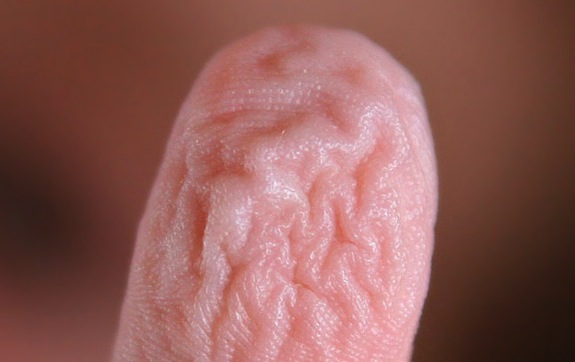Proven: Pruney Fingers Give You a Better Grip
A new study shows that when our fingers get wrinkly, they’re better at gripping wet objects
![]()

A new study shows that when our fingers get wrinkly, they’re better at gripping wet objects. Image via Wikimedia Commons/Fir0002/Flagstaffotos
Standing in the shower or sitting in the tub, many of us have looked at our wrinkled fingertips and had occasion to wonder: Why do they get so pruney when wet?
Over the years, people have pointed to a number of explanations, most commonly the idea that the wrinkles are simply a reflection of the skin absorbing water. Now, according to a study published yesterday in the journal Biology Letters by researchers from Newcastle University in the UK, we have a definitive (and more interesting) explanation: Pruney fingers are better at gripping wet objects.
The idea was first suggested in a 2011 paper, which showed that the wrinkles that form on our fingers exhibit consistent patterns that allow water to sluice away—indicating that their role is to improve traction, like the tread on a tire. For this paper, an unrelated group of researchers put the theory to the test, letting twenty volunteers soak their fingers in warm water for 30 minutes to get them good and pruney, then testing exactly how long it took them to move wet glass marbles and fishing weights from one container to another.
On average, pruney-fingered participants moved wet marbles 12 percent more quickly than when they were tested unwrinkled fingers. When the same test was performed with dry marbles, the times were roughly the same. Thus, it seems, the hypothesis was proved: pruney fingers do help us grip better.
Other research has shown that the wrinkles form as a result of blood vessels beneath the skin constricting, as directed by the autonomic nervous system. Because this is an active process—rather than merely a byproduct of the skin absorbing water, as previously assumed—scientists began looking for the underlying reason why this might be the case.
The gripping hypothesis makes sense from an evolutionary standpoint, too. “Going back in time, this wrinkling of our fingers in wet conditions could have helped with gathering food from wet vegetation or streams,” study coauthor and behavioral researcher Tom Smulders said in a press statement. “And as we see the effect in our toes too, this may have been an advantage as it may have meant our ancestors were able to get a better footing in the rain.”
If pruney fingers are better at gripping wet objects and don’t slow us down with dry ones, though, the theory prompts a question: Why aren’t our fingers permanently wrinkled? The study’s authors acknowledge this query and admit they don’t have a ready answer, but speculate that permanent pruniness could limit our fingers’ sensitivity or even make them more likely to be cut by sharp objects.
/https://tf-cmsv2-smithsonianmag-media.s3.amazonaws.com/accounts/headshot/joseph-stromberg-240.jpg)
/https://tf-cmsv2-smithsonianmag-media.s3.amazonaws.com/accounts/headshot/joseph-stromberg-240.jpg)